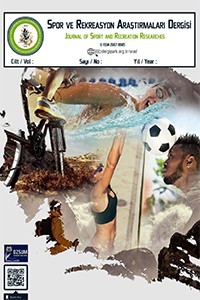SPOR BÖLÜMLERİNDE ÖĞRENİM GÖREV ÜNİVERSİTE ÖĞRENCİLERİNİN İNTERAKTİF OYUN BAĞIMLILIĞI VE SALDIRGANLIK DÜZEYLERİNİN İNCELENMESİ
Amaç: Üniversitelerin spor alanlarında öğrenim gören öğrencilerin interaktif oyun bağımlılığı ve saldırganlık düzeylerinin incelenmesidir.
Anahtar Kelimeler:
saldırganlık, çevrimiçi oyun bağımlılığı
INVESTIGATION OF INTERACTIVE GAME ADDICTION AND AGGRESSION LEVELS OF UNIVERSITY STUDENTS IN THE SPORTS DEPARTMENT
Aim: The aim of this staudy is to investigate the level of interactive game addiction and aggression of students studying in sports fields of universities.Method: The research group consists of 100 female (age; 20.22 ± 2.79) and 100 male (age; 21.12 ± 4.02) students studying in the Department of Physical Education and Sports Teaching and Sports Management of Ordu University School of Physical Education and Sports. Personal Information Form, Buss-Perry Aggression Scale Turkish Form and Online Game Addiction Scale were used as data collection instruments.Findings: Online game addiction total score of the participants how many hours per day for gaming, how much money spent per game, the longest continuous play game time, physical aggression subscale, hostility subscale, aggression total score, disruptions online game addiction subscale, success online game addiction there was a positive correlation between the subscale and the economic online game addiction subscale scores (p <0.05).Conclusion: As a result, online gaming addiction causes an increase in the level of aggression among young people, or online gaming addiction is more common among young people with high levels of aggression. Another result of the study is that men have more online game addiction, spend more time in online games and have higher scores on aggression scale than women.Keywords: aggression, online game addiction
Keywords:
aggression, online game addiction,
___
- Buss, A. H., & Perry, M. (1992). The aggression questionnaire. Journal of Personality and Social Psychology, 63, 452-459.
- Chen, L. S., Tu H. H., & Wang E. S. (2008). Personality traits and life satisfaction among online game players. CyberPsychology & Behavior, 11, 145-149.
- Demirtaş Madran, A. (2012). Buss-Perry saldırganlık ölçeği Türkçe formunun geçerlik ve güvenirlik çalışması. Türk Psikiyatri Dergisi, 23, 1-6.
- Erdoğan, E., & Özdemir, L. (2016). Üniversiteye merkezi sınav sistemi ve özel yetenek sınavı ile yerleştirilen öğrencilerin depresyon durumlarının incelenmesi ve karşılaştırılması. Uluslararası Anadolu Spor Bilimleri Dergisi, 1(1), 11-24.
- Erdoğan, E., Özden, A., & Özsoy, G. (2018). Farklı branşlardaki 10-14 yaş sporcuların bazı fiziksel ve fizyolojik parametrelerinin karşılaştırılması. Türkiye Klinikleri Spor Bilimleri, 10(2), 72-77.
- Kim, E. J., Namkoong, K., Ku T., & Kim S. J. (2008). The relationship between online game addiction and aggression, self-control and narcissistic personality traits. European Psychiatry, 23(3), 212-218.
- Ko, C. H., Yen, J. Y., Liu, S. C., Huang, C. F., & Yen C. F. (2009). The associations between aggressive behavior and internet addiction and online activities in adolescents. Journal of Adolescent Health, 6, 1-8.
- Lemmens, J. S., Bushman, B. J., & Konijn, E. A. (2006). The appeal of violent video games to lower educated aggressive adolescent boys from two countries. CyberPsychology & Behavior, 9, 638-641.
- Mehroof, M., & Griffiths, M. D. (2010). Online gaming addiction: The role of sensation seeking, self-control, neuroticism, aggression, state anxiety, and trait anxiety. Cyberpsychology, Behavior, and Social Networking, 13(3), 313-316.
- Park, J. A., Park, M. H., Shin, J. H., Li, B., Rolfe, D. T., Yoo, J. Y., & Dittmore, S. W. (2016). Effect of sports participation on Internet addiction mediated by self-control: A case of Korean adolescents, 37, 164-169.
- Oaten, M., & Cheng, K. (2006). Longitudinal gains in self-regulation from regular physical exercise. British Journal of Health Psychology, 11(4), 717-733.
- Warburton, D. E., Nicol, C. W., & Bredin, S. S. (2006). Health benefits of physical activity: The evidence. Canadian Medical Association Journal, 174(6), 801-809.
- Young, K. S., & Rogers, R. C. (1998). The relationship between depression and Internet addiction. Cyber Psychology & Behavior, 1(1), 25-28.
- Yayın Aralığı: Yılda 2 Sayı
- Başlangıç: 2019
- Yayıncı: OZSUM ACADEMIC PUBLISHING
Sayıdaki Diğer Makaleler
KADIN SPORCULARIN ŞİDDET EĞİLİMİ İLE PSİKOLOJİK DURUMLARININ BAZI DEĞİŞKENLERE GÖRE İNCELENMESİ
Ercüment ERDOĞAN, Şeyma KARATAŞ
STATİK ve DİNAMİK KASILMALARDA AKUT KAS YORGUNLUĞUNUN REAKSİYON ZAMANINA ETKİSİ
Ercüment ERDOĞAN, Serhat ÖZTÜRK
FARKLI KÜLTÜRLERDE BOŞ ZAMAN DAVRANIŞLARI: ALEVİLER ÖRNEKLEMİ
Sevim KÜL AVAN, Suat KARAKÜÇÜK
Faruk KARADENİZ, Mine MÜFTÜLER, Kürşad GÜLBEYAZ
SWİSS BALL ANTRENMANLARININ KELEBEK STİL YÜZME PERFORMANSINA ETKİSİNİN İNCELENMESİ
